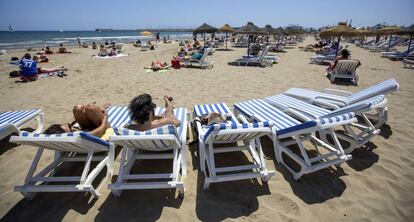Spain’s tourist regions to be hardest hit by Brexit
Valencia, Balearics and Canary Islands most likely to suffer, Spanish government report indicates
The United Kingdom’s exit from the European Union will leave winners and losers in Brussels. The cost of “Brexit,” as the process is known, will be greater in some countries than in others, depending on how the negotiations progress.

But in the heart of the member states there will also be differences. An internal report from the Spanish government looking at the consequences of Brexit has found that the regions in Spain that will be most affected by the process include Valencia, the Balearic Islands, the Canary Islands and Murcia, “due to their exposure to British tourism and other key sectors.”
Along with tourism, the report concludes that the other most-affected sectors will be the automotive, and pharmaceutical industries as well as agribusiness.
The effects of Brexit on Spain will be diverse. Murcia and Melilla, for example, could end up receiving lower funding from the EU, given that the UK’s exit will reduce the bloc’s per capita income. Even so, the Spanish administration is not predicting much of an impact on this front.
Spain’s tourism, automotive and pharmaceutical sectors and agribusiness will be most affected by Brexit
In terms of tourism, the document that has been signed by several ministries and the Spanish embassies in the EU and London suggest that the places that receive the greatest number of British tourists are the Canary Islands (a third of the total), Valencia region (15.8%), the Balearics (13%) and Catalonia (10.7%). What’s more, the Canary Islands could be affected by changes caused by Brexit in terms of the financing of so-called “ultra-peripheral regions.” The document calls on the government to try to maintain the “current parameters” relating to support policies for regions such as the Canary Islands, which are located off the northwestern coast of Africa.
Brexit may also have a notable effect on agriculture and fishing in Spain. Traditionally, the United Kingdom has been highly critical of the EU’s Common Agricultural Policy and the funds destined to it. “The exit of the United Kingdom should favor the defense of [Spanish] interests,” the text reads.
Even so, the effect could be a fall in exports: the United Kingdom is a major importer in sectors such as fruit and vegetables, olive oil, meat products, wine and other beverages. Spain is expecting “a rise in non-tariff barriers,” with the establishment of new health controls, which could end up affecting the Spanish regions where this activity is concentrated.
The same situation is forecast for the fishing industry. “The withdrawal of the United Kingdom will affect the activity of the Spanish fleet.” The problem will lie with 80 Spanish boats that currently fish in British waters. To solve the problem, Spain will look to “negotiate a bilateral fishing agreement between the EU and the United Kingdom.” But Brexit will also affect the part of the British fleet owned by Spanish capital. There are around 40 boats that belong to Galician entrepreneurs, the document explains, who could lose their status as part of the community fleet.
Tu suscripción se está usando en otro dispositivo
¿Quieres añadir otro usuario a tu suscripción?
Si continúas leyendo en este dispositivo, no se podrá leer en el otro.
FlechaTu suscripción se está usando en otro dispositivo y solo puedes acceder a EL PAÍS desde un dispositivo a la vez.
Si quieres compartir tu cuenta, cambia tu suscripción a la modalidad Premium, así podrás añadir otro usuario. Cada uno accederá con su propia cuenta de email, lo que os permitirá personalizar vuestra experiencia en EL PAÍS.
¿Tienes una suscripción de empresa? Accede aquí para contratar más cuentas.
En el caso de no saber quién está usando tu cuenta, te recomendamos cambiar tu contraseña aquí.
Si decides continuar compartiendo tu cuenta, este mensaje se mostrará en tu dispositivo y en el de la otra persona que está usando tu cuenta de forma indefinida, afectando a tu experiencia de lectura. Puedes consultar aquí los términos y condiciones de la suscripción digital.









































